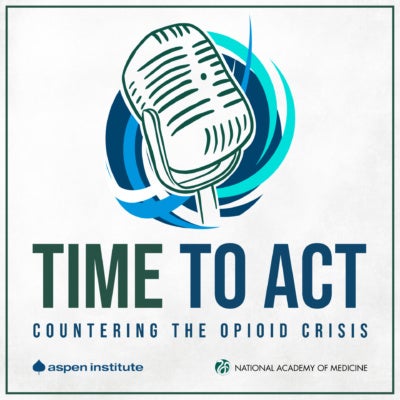-
Time to Act

The response to the U.S. opioid crisis has been fractured, making it hard for experts to collaborate and share best practices. This approach has led to an abundance of policies and solutions, many of which target small portions of the crisis rather than taking a holistic view. To bring together experts from across industries, organizations, and specialties, the Aspen Institute and National Academy of Medicine launched the Action Collaborative on Countering the U.S. Opioid Epidemic. Through convenings, publications, strategic partnerships, webinars, this podcast, and other outlets the experts who comprise the Action Collaborative aim to uplift established evidence, promote best practices, identify research gaps, and identify collaborative approaches to countering the opioid crisis.
In each episode of Countering the Opioid Crisis: Time to Act, Ruth Katz, Vice President and the Executive Director of the Health, Medicine and Society Program at the Aspen Institute and co-chair of the NAM’s Action Collaborative, will host experts who will discuss various aspects of the opioid crisis, the response, and research that is being conducted to better understand the disease of addiction and the management of chronic pain.
Listen and Subscribe on: Apple Podcasts | Audible | Spotify | Stitcher
Episode 4: Addressing the Recent Trends in the Opioid Epidemic
In the depths of the COVID-19 pandemic last year, we experienced the highest annual increase in drug-related deaths in 50 years, nearly 30% higher than in 2019, according to the Centers for Disease Control and Prevention. In this episode, we will explore the opioid crisis at the local, state, and federal levels to learn what tactics are being utilized to serve different populations in response to today’s deadly trends.
Dr. Rachel Levine, the U.S. Assistant Secretary for Health and co-chair of the NAM’s Action Collaborative on Countering the U.S. Opioid Epidemic, and Brad Finegood, Strategic Advisor in Public Health in Seattle & King County in Washington State, expand on the latest overdose statistics from the CDC, and how addressing these trends can help us better support individuals with substance use disorder. Assistant Secretary Levine offers insight into the federal response, which addresses the four pillars of prevention, harm reduction, treatment, and recovery. Working on the frontlines of the opioid crisis in Seattle, Brad shares his experience building community-first strategies to combat overdoes and the toll that increased drug use has had in his region. Listen for more about how we can turn the tide on the opioid epidemic in the United States at all levels.
Episode 3: Racism and the American Opioid Epidemic
In this episode, Ruth Katz hosts Dr. Helena Hansen, professor, and chair of the research theme in translational social science and health equity at the University of California, Los Angeles, and Joy Rucker, the former executive director of the Texas harm reduction Alliance, to discuss the role of racism in America’s opioid epidemic. Recent data indicates that overdose fatalities have disproportionately impacted communities of color. This underscores the need for health equity to lead the response to this epidemic. Helena and Joy explore the societal, health, and policy systems that contribute to disparities in care for people of color with opioid use disorder (OUD) and offer solutions to ensure better outcomes for Black and brown communities in the opioid epidemic. Listen to learn more about how we can reform systems of inequity in the opioid epidemic to increase access to treatment and provide better outcomes for Black and brown communities. View the full transcript.
Episode 2: Stigma, Addiction, and Health Care
In the second episode of Countering the Opioid Crisis: Time to Act, Ruth Katz hosts health information technology expert Edna Boone and Dr. Charlene Dewey, a professor at Vanderbilt University Medical Center, to understand the role of stigma in the U.S. opioid epidemic. There are more than 3 million people in the United States with an opioid use disorder (OUD), yet approximately 80% of those with OUD go untreated. Limited numbers of treatment providers and treatment accessibility are frequently discussed barriers to patients receiving high-quality health care but the detrimental impact of stigma on these individuals remains less well known. Edna and Charlene dive into how OUD became stigmatized, the ways in which stigma presents itself in the care journey, and what can be done to overcome the stigma of addiction. Listen to learn more about actionable opportunities to address stigma in the health system and to improve the quality of care for individuals with OUD. View the full transcript.
Episode 1: An Epidemic within a Pandemic
Guests: Kelly Clark, American Society for Addiction Medicine; Daniel Sledge, Williamson County Mobile Outreach TeamThe COVID-19 pandemic has compounded and intensified the barriers many people experience when trying to access treatment and harm reduction services for substance use disorders due to physical distancing protocols and fear of infection. However, the pandemic has also created an environment in which clinicians have been given more flexibility in providing care to patients. During this episode, Kelly Clark, an addiction medicine expert, and Daniel Sledge, a first responder, will discuss how providing care to patients, access to treatment, and caring for those in urgent need of assistance has been impacted by the COVID-19 pandemic. View the full transcript.
Produced and edited by Shanna Lewis
Theme Song by Benjamin Lerner & Joshua Sherman, Recorded at Old Mill Road Recording, East Arlington, Vermont
(C) 2020 by Joshua Sherman Productions, L.L.C., All Rights Reserved.